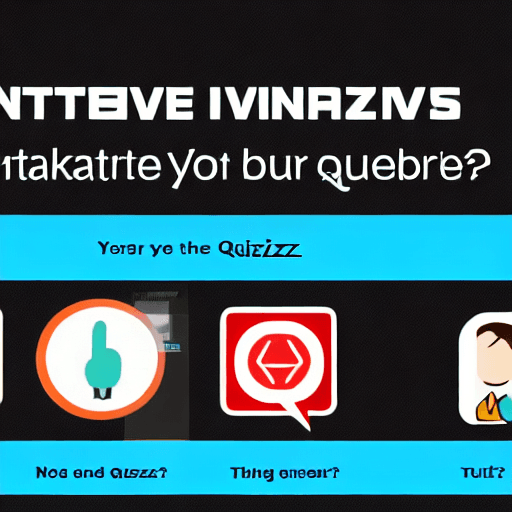

In today’s digital landscape, capturing and maintaining audience attention is a significant challenge for brands. Traditional marketing methods are often met with skepticism and declining engagement rates. Social media platforms, while offering unprecedented reach, are saturated with content, making it harder than ever to stand out. The key to overcoming this hurdle lies in creating experiences that actively involve your audience. One incredibly effective strategy is the use of interactive quizzes. This article delves into the power of interactive quizzes for brand awareness, exploring how they can be designed, implemented, and leveraged to drive meaningful engagement and ultimately, strengthen your brand.
Interactive content, broadly defined, encompasses any content that requires the user to actively participate. It moves beyond passive consumption – reading a blog post or watching a video – and demands a response. This shift in behavior is driven by several factors. Firstly, users are increasingly seeking personalized experiences. Secondly, they crave a sense of control and agency. Finally, interactive content simply feels more rewarding and memorable. Quizzes, in particular, tap into the human desire for self-assessment and knowledge acquisition. They provide instant gratification – a score, a result, a personalized feedback – which fuels further engagement.
Let’s examine the specific reasons why interactive quizzes are so effective for boosting brand awareness.
The success of your quiz hinges on its design. A poorly designed quiz will likely be ignored, while a well-crafted one can become a powerful tool for brand building. Here’s a breakdown of key considerations:
Before you start building, clearly define what you want to achieve with the quiz. Are you aiming to increase brand recognition? Educate your audience about a specific product or service? Generate leads? Your objectives will dictate the content, format, and call to action of the quiz.
Several quiz formats are available. Consider these options:
Your questions should be relevant, interesting, and easy to understand. Avoid overly complex or technical language. Use a mix of question types – multiple choice, true/false, open-ended – to keep things dynamic. Ensure the questions flow logically and build upon each other.
Visuals play a crucial role in quiz engagement. Use high-quality images and graphics that align with your brand’s aesthetic. Ensure the quiz is visually appealing and easy to navigate. Consider using animations and transitions to add a touch of excitement.
The result page is the culmination of the quiz experience. It should be personalized, engaging, and relevant to the user’s answers. Clearly communicate the outcome and provide a call to action – encourage users to share their results, sign up for your newsletter, or visit your website. Consider offering a downloadable resource or discount code as an incentive.
The platform you choose to host your quiz will impact its reach and engagement. Here’s a breakdown of popular options:
Facebook quizzes are incredibly popular due to the platform’s massive user base. You can create quizzes directly within Facebook or use third-party quiz apps. Promote your quiz through paid advertising to reach a wider audience. Encourage users to share their results on their own timelines.
Instagram quizzes are gaining traction, particularly with the introduction of Instagram Stories quizzes. These quizzes are highly engaging and easily shareable. Use visually appealing graphics and animations to capture attention. Utilize Instagram’s interactive stickers to create a seamless quiz experience.
Twitter quizzes can be effective for quick, engaging content. Use a shortened link to your quiz and encourage users to retweet their results. Consider running a contest to incentivize participation.
For B2B brands, LinkedIn quizzes can be a valuable tool for lead generation. Focus on industry-related knowledge quizzes and offer valuable insights to your audience. Promote your quiz to relevant groups and communities.
It’s crucial to track the performance of your quiz to understand what’s working and what’s not. Here are key metrics to monitor:
Social media quizzes are a powerful tool for brand building, lead generation, and audience engagement. By carefully planning, implementing, and measuring your quiz, you can create a valuable asset that drives results. Remember to focus on creating an engaging and relevant experience for your audience, and continuously optimize your quiz based on performance data.
This comprehensive guide provides a solid foundation for creating and implementing successful social media quizzes. Good luck!
Tags: brand awareness, interactive quizzes, social media engagement, marketing, quizzes, brand building, engagement strategy, social media marketing, quiz design, lead generation
[…] Create interactive quizzes to test your audience’s knowledge and entertain […]